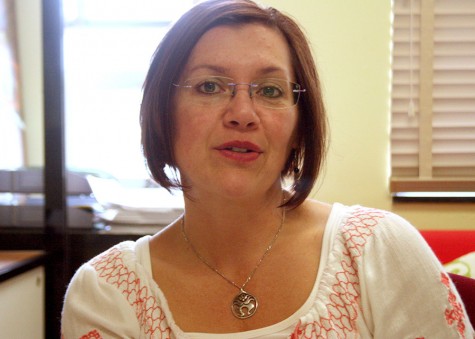Communication studies professor reflects on Guatemalan heritage
April 20, 2015
After taking courses in feminist theory and communication, Linda Scholz, a Guatemalan-American, became a professor in communication studies.

Linda Scholz, a professor of communication studies, reflects on her life as a Guatemalan- American and her choice to be a professor.
Scholz, who is a first generation American, considers herself bi-cultural because she is accustomed to both the American and Guatemalan cultures. She said her parents came to the United States in the 1950s.
Scholz said she and her family lived in Los Angeles and were working class; when she was younger and had a white stepmom whom she was close with, so close that she called her “mom.” In the early ‘80s, her family moved back to Guatemala, but to this day she is unsure why.
Her father came illegally to the United States twice and was deported twice. Scholz said he watched T.V. to learn English and lived on a balcony of a home.
“He put plastic up so rain would not get in and I don’t think that he was fully accepted in a way that he would have wanted to be,” Scholz said.
Scholz said her grandmother was Guatemalan and her grandfather was German and although they had four children together, they never married; she said the family suspects he may have been a Nazi.
Scholz, who is also a first generation college student, enrolled in a gender class while as an undergrad as well as taking courses in women’s studies and began to fall in love with feminist perspectives.
She said while in the course she read feminist perspectives from African-American, Latino and Asian women.
Scholz said she did not even think about pursing higher education until taking these courses.
She considers going to college being somewhat of an accident because her friends were going, which is when she took the courses in gender and communication. Scholz, who has been teaching since 1996, said the interests students have excite her and that is what keeps her in the educational field.
Scholz said she has been particularly impressed by the students involved in the registered student organizations such as the Latin American Student Organization, Pride, NAACP, Women’s Empowerment League and many more.
“I am thrilled to see them applying course subject matter to the work that they do outside of the classroom,” Scholz said. “Students can do amazing applied, insightful and impactful work when professors show they believe in them.”
Because her parents have passed and her mother used to always speak in Spanish, Scholz said she often does not get a chance to speak Spanish. She said when her family passed, not only was it a loss of a loved one and family member, but also because it was a loss of a culture because of how often Spanish was spoken.
Because Scholz has a light complexion, she said she experiences racism differently than other minority women. Scholz said she could benefit from white privilege because many do not perceive her as being Latina.
“This doubt often comes in the form of denying me my upbringing, of telling me that I am simply ‘American’ and therefore ‘white;’ this can be very hurtful as it denies my whole being,” Schulz said.
Scholz said her experience as a Latina professor has been a positive one as students have been comfortable with asking her about her Guatemalan culture and background. She said not many students have been or seen the country, so she is able to share her experiences and relate them to educational subject matters.
Roberto Hodge can be reached at 581-2812 or rlhodge@eiu.edu.



















![[Thumbnail Edition] Senior Foward Macy McGlone, getsw the ball and gets the point during the first half of the game aginst Western Illinois University,, Eastern Illinois University Lost to Western Illinois University Thursday March 6 20205, 78-75 EIU lost making it the end of their season](https://www.dailyeasternnews.com/wp-content/uploads/2025/03/WBB_OVC_03_O-1-e1743361637111-1200x614.jpg)
















































